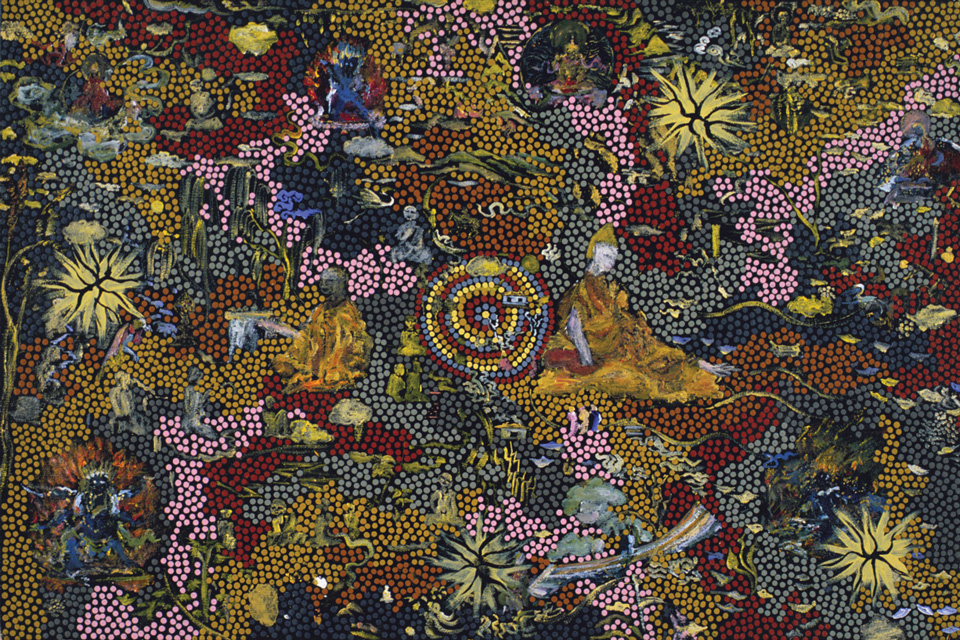 |
| Reincarnation, Tim Johnson and Clifford Possum Tjapaltjarri. The Vizzard Art Collection. |
Maintain radio silence.
A Rat.
We've been waiting for this.
Entropy in decaying forms made the mission, well this mission, urgent.
From a parallel world.
Everything became possible. To be in two places at once. To travel in the blink of an eye, as the old expression went.
The meta-intelligences metastasised. Millions, ultimately billions of calculations, everyday, all day.
So long in the making, this conjunction of circumstance.
"Everybody hated this guy." He heard the operatives say it, think it, time and again. Always in the past tense.
The psychological battering those assholes delivered to their targets was beyond anything he had ever endured, outside the norm of human consciousness. A battering in which they reveled, these sod awful bastards. They lay in the lowlife and the reeds, school bullies and strutting idiots, gronks stirring up hatred, encouraging their targets to suicide. Outside all normal judicial processes, meddling with vigilante groups and fringe elements of neighbourhood policing, these extra-judicial killings took place in front of everybody's eyes.
They were just disguised.
This was a government frightened of ideas. Now they were targeting journalists.
He had seen it before; the way these low ranked slobs threw their victims to the wolves, made ribald jokes with their mates, sniveled into their own armpits, went home to their dreary wives and ungrateful children. Lived their dismal routine lives as if they were King Shit, on their barely average salaries.
The nobility of labour.
Such fancy ideas flew a mile over their heads.
Basically they were just assholes.
Pitched to make a journalist's life as miserable as possible.
And paid by the taxpayer to do it.
Their problem was: he knew too much. He knew just how dishonest they were. He knew how far they would creep to stay in good with their bosses.
And Old Alex knew how truly rank their bosses were.
He knew what they had done.
How he knew?
None of their goddamn business.
It didn't matter anymore in any case.
Time and evolution had already left them behind, genetic debris.
"Be gentle with him. He might shoot himself."
They'd like that. These loyal lieutenants who resented anyone who was different.
Scrape the mud off your shoe. Keep the guns tight in the cupboard. Bide your time. Wear the humiliation. Sneer at the poofters.
The official government message was a prattle on diversity. Yet the government operatives and military gronks they loved to employ were far more conformist, far less tolerant than the general population. The same lowlife gronks. The same malicious intent. The same dim, barely human consciousness.
The military operatives could not understand why the civilian population would not comply.They had no understanding of life outside their barracks.
Trust not. Want not.
Charged with protecting the institutions of the country, instead they destroyed them by destroying the people's faith in their own governing bodies.
And then, one fine and glorious generation, the invisible girdle of psychics and mystics and sensates, empaths and incarnates, the bodied and the disembodied and the truly gifted who circled the globe vanquished evil in an instant.
"Game changer" became the phrase of the moment.
"We should help this guy," one of the more cluey of the operatives monitoring him said one day. "And we should protect him.""Game changer" became the phrase of the moment.
And that was where he got his cue, in a large stone house on the edge of a canyon in the middle of winter.
That they weren't all enemies. That they weren't all stupid. That in the higher and even more secretive echelons of the organisation some of the most brilliant philosophical and analytical minds had come together to research the darkness, the spiritual stain that was settling on the planet, and find ways to overcome it.
In the end, they kept their side of the bargain.
Transactional. He learnt. They learnt.
The longer he had hidden, the longer he stayed hiding in the ordinary, the less he liked himself or the world at large. And the more depressed he had become. It had been the coward's way out. Never step out. Remain in hiding. Die a drunk in a caravan park, wreathed in failure, shouting at invisible torturers, at the injustices which once infested his own interior timeline.
Injustices perpetrated by people long dead. Who should have been forgiven long ago.
With all their considerable access to power and intelligence, multiple intelligences, the government operatives could be as helpful or as dangerous as they chose to be.
But just as the most senior members of the clan, the keepers of mysteries, had always known, as Shakespeare had so famously written, there are more things in heaven and on earth than can be found in your philosophy.
What does the Minister say?
For we are obedient. We must always comply. We must please the hierarchy.
The main fear being that whoever was the hapless alleged miscreant of the day, having defied whatever cant or regulation of the moment, who had breached procedures or standards or regulations only haphazardly imposed, would become jobless, lose status, be thrown on the scrapheap of their own and the nation's history, unable to support themselves or their children or their lifestyles. Living out of piles of rubbish, dirty blankets and paper bags.
And never make it back to that glorious place: a home of their own, prestige, a smart car, a wage. A comfortable life.
Whether they were destroying the country in the process or not was none of their business.
They were just doing their jobs.
They had no higher or lower motive.
It had always been the same.
For much of the race, it was simply a matter of survival.
The Minister has ordered a rethink. An internal inquiry. A change of strategy.
They loved their internal inquiries.
There were always new generations of bureaucrats strutting their stuff and spreading fear through institutional corridors and open plan offices.
While the Minister concerned bided his time before it would be his turn to be top dog.
And maybe, just maybe, make a difference before the country plunged straight off the cliff's edge.
As for the ministers of the church, the Universal Church, or whichever belief structure they were clinging to this week, the local minister, frightened, already knew the old gods had failed, but clung to ritual and instructed his flock nonetheless. They must never know how weak was the case. The mystery that passeth all understanding had been delimited to a string of rituals, incense, holy smoke, the turning of pages of an oft reprinted book, the voices of the prophets and a desperate clutching at something they had no hope of comprehending, or proving, a benevolent god.
As elusive as a benevolent AI.
One estimate put the number of followers of the Abrahamic faiths, Christianity, Islam and Judaism, at 3.6 billion.
"I think it's time humanity transcended the Abrahamic gods," Old Alex said in a flash of somnolent elegance, legs crossed, gazing down a long line of wintry white sand, a cluster of trainee lifesavers looking more like a herd of black shorthorn cattle from a distance.
So they cling to the Abrahamic gods, or singular god as they liked to think. I am a jealous god. You shall have no other god but me.
Um, why would that be?
Power. It was always about power.
THE BIGGER STORY:
Overrun. Dismissed.
Simmering anger in indigenous Australia over a failure to make good for past wrongs could easily turn into organised armed resistance, Aboriginal academic Mick Dodson has warned.
In launching a new thriller by former journalist and political staffer Peter Cotton, Professor Dodson said the book’s central premise — Aboriginal activist gangs working to topple the state and seize back the land stolen from them — was “fiction but let’s not be negligent and one day it becomes reality”.
The novel, Dead Heat, is set in the near future and features Aboriginal communities in Jervis Bay on the NSW south coast and in central Australia, where Mad Max-style road conflicts take place between black and white characters.
Kidnappings and gruesome deaths are central to the plot.
Professor Dodson, a former Australian of the Year, was struck on reading the book by the thought “I know these characters, I’ve met them — the blackfellas and the whitefellas”, and felt it captured the “unsatisfied anger” of indigenous Australia over historical and ongoing dispossession, and the lack of an adequate place at the modern political table.
“Unsatisfied anger is something throughout history that’s caused conflict; generally speaking, anger as an emotion is in most instances justified (and) in Dead Heat I see such a plausible scenario,” he said.
“The benefits that we enjoy today come from the dispossession of the indigenous people of this country — dispossession of land and language and culture, our kids and our resources.
“We’re trying to say, ‘Look, it’s time we addressed not just what happened 230 years ago but the impact of that over 230 years, which is still being felt today’. It makes people angry when it gets dismissed.
“We try and say ‘Well (Malcolm) Turnbull, here’s a way forward with the Uluru Statement from the Heart’ and the door is slammed in your face.
“People say why are you getting angry — hello?”
A joint parliamentary committee examining the Uluru statement’s call last year for an indigenous “voice” to parliament in the Constitution — a proposal the Prime Minister initially rejected — this week said it would nevertheless persevere with finding ways to recommend the idea.
Editor Note: After years of stirring up misguided hope and spending millions of dollars of public funds, the government dismissed the Uluru statement by press release, not even bothering to inform the leading proponents of their decision. This appalling government has no intention of doing anything whatsoever in this space and any statement to the contrary is just a blind.


